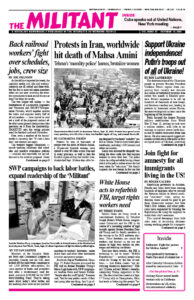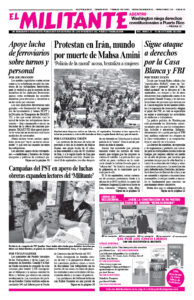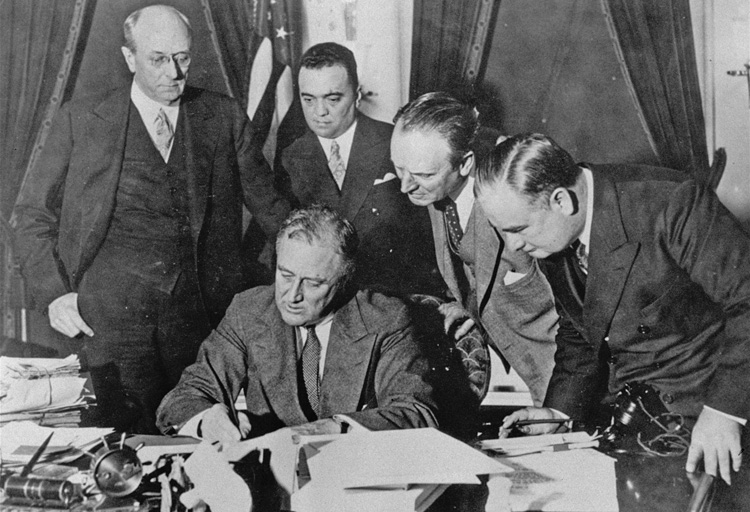The Spanish-language edition of 50 Years of Covert Operations in the US: Washington’s Political Police and the American Working Class by Larry Seigle, Farrell Dobbs and Steve Clark, is one of Pathfinder’s Books of the Month for October. It traces the capitalist rulers’ use of Washington’s political police to target the unions and other working-class organizations, as well as mass movements for Black equality and against the Vietnam War. Today the Democrats wield the FBI to go after former President Donald Trump and others, attacking constitutional freedoms vital for the working class. The excerpt is from the chapter “Origins of FBI Assault on Socialist Workers Party.” Copyright © 2014 by Pathfinder Press. Reprinted by permission.
For several years after the First World War, the FBI had functioned as a political police force, carrying out the arrest or deportation of some 3,000 unionists and political activists in 1919 and 1920 (the infamous “Palmer Raids”). But following widespread protests over these and other FBI actions, and with the decline of the postwar labor radicalization, the capitalist rulers decided against a federal secret police agency. …
By the mid-1930s, however, a vast social movement was on the rise, with the Congress of Industrial Organizations (CIO) at the forefront. The relationship of forces was shifting in favor of working-class organizations. The bosses’ old methods could no longer always be counted on. Communist perspectives did not come close to commanding majority support among working people, and in fact remained the views of a small minority, but the bosses were nonetheless concerned that progressive anticapitalist and anti-imperialist political positions advanced by class-struggle-minded union leaders were winning a hearing among a substantial section of the ranks of labor. Especially in times of crisis, such as war, minority points of view defended by established and respected working-class fighters could rapidly gain support.
With this in mind, the administration of President Franklin Roosevelt expanded and centralized federal police power. …
[T]hese FBI operations began on the eve of the Second World War. They were central to preparations by the US capitalist rulers to lead the nation into another carnage to promote their interests against their imperialist rivals and against the peoples of Asia, Africa, and Latin America struggling for liberation from colonial domination. These operations were directed against the leadership — and potential leadership — of the two major social forces in the United States that threatened to interfere with the ability of the US ruling families to accomplish their objectives: the labor unions and the Black movement. …
The drive toward war necessitated an assault on working people at home and against democratic rights in general. Roosevelt gave FBI chief J. Edgar Hoover free rein to use the FBI against the labor movement and Black organizations. The White House and Justice Department secretly authorized many of the illegal methods used by the FBI and turned a blind eye toward others.
This authorization for the FBI to assume the functions of a political police force was done without legislation, which would have had to be proposed and debated in Congress. It was accomplished instead by “executive order,” a device that was rapidly assuming a major place in the operations of the government and would increasingly become a major mode of governing in the decades to come.
On September 6, 1939, Roosevelt issued an executive order directing the FBI “to take charge of investigative work” in matters relating to “espionage, counterespionage, sabotage, subversive activities and violations of the neutrality laws.” The key phrase was “subversive activities,” and the most important decision was to include this slippery concept in the list of responsibilities given the FBI. While there were federal laws against espionage, sabotage, and violation of US “neutrality,” no law explained what “subversive activity” might consist of.
Two days later Roosevelt — again by executive decree — made a “finding” of the existence of a “national emergency.” This allowed an increase in military spending without having to ask Congress… . Simultaneously, the president ordered an expansion of the FBI’s forces. His objective, Roosevelt told a news conference, was to avoid a repetition of “some of the things that happened” during World War I:
There was sabotage; there was a great deal of propaganda by both belligerents, and a good many definite plans laid in this country by foreign governments to try to sway American public opinion. … It is to guard against that, and against the spread by any foreign nation of propaganda in this country which would tend to be subversive — I believe that is the word — of our form of government.
Forty years later, in a Foley Square courtroom in New York City, top Justice Department officials would cite Roosevelt’s words as providing legal authority — derived from the president’s “inherent powers” under the US Constitution — for the FBI’s campaign of spying, disruption, and provocation against the Black movement, unions, and antiwar and women’s liberation fighters and against communist organizations such as the Socialist Workers Party and Young Socialist Alliance.
As the trial of the SWP lawsuit unfolded during the spring of 1981 in Judge Griesa’s courtroom, it became increasingly clear that the case revolved around issues far deeper than particular FBI abuses. The historical evolution of the FBI is part of a broader phenomenon in the United States. Underlying the threat today to the rights of privacy and freedom of association is the arbitrary rule by an expanding federal executive power. This power carries out policies at home and abroad that it is less and less able to openly proclaim or mobilize majority support for. It relies increasingly on covert methods to accomplish hidden or half-hidden objectives. …
[A]dvocating ideas and taking actions that are not illegal — even as defined by reactionary legislation — but are nonetheless considered inimical to the interests of those in power can make you the target of the political police.


